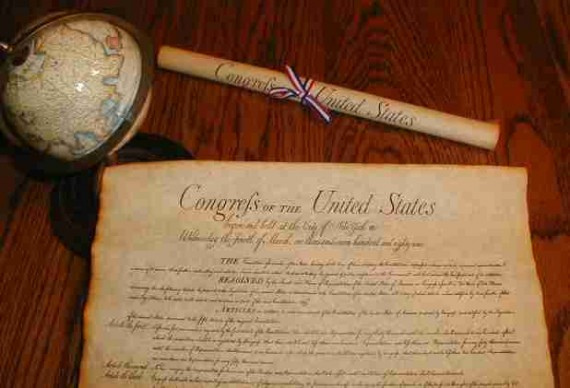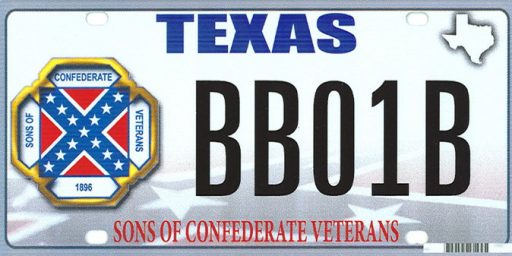James Clyburn Uses Arizona Shootings To Call For Return Of “Fairness Doctrine”
The political firestorm that has erupted in the wake of the shootings in Arizona is drifting, inevitably, into calls for more government control over the content of speech.
One of the reasons that the call from some quarters to use the shootings in Arizona to open a “national dialogue” on so-called “heated” political rhetoric concerns me is that, more often than not, that discussion inevitable leads to calls to restrict political speech in some way. Already we’ve had one Congressman suggest that advertisements that mimic the so-called “target” ad that has become the focus of attention since Saturday should be outlawed. Another suggested that using a phrase like “job killing” was inflammatory. Now, the third-ranking Democrat in the House is calling for a return to one of the most ill-advised government regulations of speech of all time:
U.S. Rep. Jim Clyburn, the third-ranking Democrat in Congress, said Sunday the deadly shooting in Arizona should get the country thinking about what’s acceptable to say publicly and when people should keep their mouths shut.
Clyburn said he thinks vitriol in public discourse led to a 22-year-old suspect opening fire Saturday at an event Democratic U.S. Rep. Gabrielle Giffords held for her constituents in Tucson, Ariz. Six people were killed and 14 others were injured, including Giffords.
The shooting is cause for the country to rethink parameters on free speech, Clyburn said from his office, just blocks from the South Carolina Statehouse. He wants standards put in place to guarantee balanced media coverage with a reinstatement of the Fairness Doctrine, in addition to calling on elected officials and media pundits to use ‘better judgment.’
‘Free speech is as free speech does,’ he said. ‘You cannot yell ‘fire’ in a crowded theater and call it free speech and some of what I hear, and is being called free speech, is worse than that.’
(…)
Despite Clyburn’s position, law enforcement has not yet revealed any motives in the shooting.
When the Supreme Court upheld the FCC’s authority to impose the “fairness doctrine” in Red Lion Broadcasting v. FCC in 1969, it specifically cited as justification for that authority the fact that there were a limited number of broadcast stations available:
Where there are substantially more individuals who want to broadcast than there are frequencies to allocate, it is idle to posit an unabridgeable First Amendment right to broadcast comparable to the right of every individual to speak, write, or publish. If 100 persons want broadcast [395 U.S. 367, 389] licenses but there are only 10 frequencies to allocate, all of them may have the same “right” to a license; but if there is to be any effective communication by radio, only a few can be licensed and the rest must be barred from the airwaves. It would be strange if the First Amendment, aimed at protecting and furthering communications, prevented the Government from making radio communication possible by requiring licenses to broadcast and by limiting the number of licenses so as not to overcrowd the spectrum.
This has been the consistent view of the Court. Congress unquestionably has the power to grant and deny licenses and to eliminate existing stations. FRC v. Nelson Bros. Bond & Mortgage Co., 289 U.S. 266 (1933). No one has a First Amendment right to a license or to monopolize a radio frequency; to deny a station license because “the public interest” requires it “is not a denial of free speech.” National Broadcasting Co. v. United States, 319 U.S. 190, 227 (1943).
By the same token, as far as the First Amendment is concerned those who are licensed stand no better than those to whom licenses are refused. A license permits broadcasting, but the licensee has no constitutional right to be the one who holds the license or to monopolize a radio frequency to the exclusion of his fellow citizens. There is nothing in the First Amendment which prevents the Government from requiring a licensee to share his frequency with others and to conduct himself as a proxy or fiduciary with obligations to present those views and voices which are representative of his community and which would otherwise, by necessity, be barred from the airwaves.
(…)
Rather than confer frequency monopolies on a relatively small number of licensees, in a Nation of 200,000,000, the Government could surely have decreed that [395 U.S. 367, 391] each frequency should be shared among all or some of those who wish to use it, each being assigned a portion of the broadcast day or the broadcast week. The ruling and regulations at issue here do not go quite so far. They assert that under specified circumstances, a licensee must offer to make available a reasonable amount of broadcast time to those who have a view different from that which has already been expressed on his station. The expression of a political endorsement, or of a personal attack while dealing with a controversial public issue, simply triggers this time sharing. As we have said, the First Amendment confers no right on licensees to prevent others from broadcasting on “their” frequencies and no right to an unconditional monopoly of a scarce resource which the Government has denied others the right to use.
It’s unclear whether this view of the First Amendment would even survive scrutiny in the Supreme Court today, largely because the Court’s reasoning really doesn’t stand up to sustained analysis.
The public does not own the airwaves; the people who have invested the money to transmit programming do. Notwithstanding the Court’s analysis, there’s no reason that ownership of the airwaves should be any different from ownership of any other kind of property: a radio station owner determines the frequency they want to use and they registers the frequency with a central authority so no other station can use that frequency within a specified geographic area. If they do, then it’s legally no different from trespassing and appropriate legal action would be available.
Obviously things are more complicated than that but the fact remains that radio station owners pay for their programming from advertisers public funds. Advertisers expend their resources based upon the audience they want to reach, meaning that programming that is more popular, or that attract a desirable demographic mix of viewers/listeners makes more money. The reason that Rush Limbaugh and Sean Hannity are on the air isn’t because of some vast conspiracy, but because they attract listeners, and profits, for their respective employers. If that were to end at some point, so would their careers.
Buying into the myth of “public airwaves” has many perils. If the FCC can demand that a talk radio station give equal time for all points of view (whatever that even means), what is to stop them from saying that some viewpoints are too “inflammatory” or dangerous to be broadcast on the “public airwaves” ? What is to stop Congress from setting up similar unelected bodies to impose similar regulations on newspapers, magazines, and blogs? Newspapers are delivered on public roads, magazines are transmitted through the U.S. mail, and the internet is transmitted over utility lines which are often also regulated by the government. Aren’t these, like the mythical public airwaves, also “public” resources?
More importantly, though, we no longer live in an era of limited “public airwaves.” Thanks to advances in technology, it is possible for just about any political view to be heard in today’s media with the Internet, cable networks, satellite radio, newspapers, radio and TV available. Even if the Court were to continue to accept the legal reasoning in Red Lion, the facts have changed so much that it is impossible to say that the FCC must have the authority to require broadcasters to give “equal time” to “opposing points of view.”
Finally, it’s worth noting what has happened since the end of the Fairness Doctrine in 1987. The rise of talk radio, which would not have been possible if the rules were still in place, revitalized AM radio throughout the country and turned it from place where you heard either inferior sounding music (compared to FM) or bland “news talk” that did everything possible to avoid taking a side on any issue to someplace that is vibrant and lively. Yea, a lot of contemporary talk radio is inane in a different way but it certainly is a more accurate reflection of what the public wants than anything that was heard in the bland “equal time” era. More importantly, if you don’t like what’s on talk radio, you’ve got dozens of alternatives. The marketplace has done a better job at creating equal time than the FCC ever did. Someone should inform Congressman Clyburn of that.







One of the many reasons why I hate it when people ask me who my congressman is. But I’m still keeping alive the dream of the day when Jim is soundly defeated by a common-sense conservative.
First of all, the Fairness Doctrine does not have, and will not have, anywhere near the support required to be re-instituted. It simply won’t happen. Neither will the rest of the speech restrictions members of Congress are bandying about in their overreactive freakout.
Second, where do you get this stuff?
The public does not own the airwaves; the people who have invested the money to transmit programming do.
Total horseshit. Do you just make these things up? The public absolutely does own the airwaves, and the government licenses it to broadcasters.
I can purchase a transmitter and start broadcasting on radio. I’ve now invested money to transmit programming, therefore I own the bandwidth, right?
You can put “public airwaves” in quotes all you want, claiming they are a myth, but you are absolutely wrong, and provide absolutely no support for your assertion.
You make some equally stupid comparisons, too:
What is to stop Congress from setting up similar unelected bodies to impose similar regulations on newspapers, magazines, and blogs? Newspapers are delivered on public roads, magazines are transmitted through the U.S. mail, and the internet is transmitted over utility lines which are often also regulated by the government. Aren’t these, like the mythical public airwaves, also “public” resources?
First of all, yes they are public resources (again, no need for quotes. They are public). But there’s no limit to how many newspapers can travel by road. Ditto magazines and the internet. Radio and television spectrum is limited (and broadcasters get it for free, I might add). Is this difference lost on you?
Anyway, it’s all moot in light of the fact that the Fairness Doctrine is never, ever coming back (and good riddance), despite the rumblings of a handful of members of Congress. But it’s worth pointing out how willing libertarians are to distort the facts in order to support their wishful thinking that the public owns nothing.
In that situation, the “central authority” would be the owner of the airwaves, because they have the authority to say who can and can not use it, and under what conditions. Since that “central authority” is the FCC, and since the FCC is a public institution, then I think it’s fair to say that the airwaves are owned by the public.
The same thing that stopped them from enforcing the fairness doctrine.
All of those are time-multiplexed, not space-multiplexed. Adding more cars to the road doesn’t exclude other cars, it just slows everybody down a little. Same with adding more mail to the USPS, and more traffic on the internet. With broadcast TV and radio, adding a new station to a geographic area will prevent any other TV or radio station from using the same frequency in the same area. Both geography and usable broadcast spectrum are finite resources, while time is (on human timescales anyway) infinite. I think any rational person would agree that infinite public resources don’t need the same kind of regulation that finite public resources do.
That said, the sheer amount of information access provided by the internet certainly should change they way information is regulated. As broadcast becomes the minority source of people’s political information, it doesn’t make sense to even bother regulating the information they disseminate.
All of those are time-multiplexed, not space-multiplexed.
Networking geek alert!
I rarely listen to talk radio, but it has its place and the people apparently want it..I mean the real people, not the make believe people that liberals like to talk about owning the airwaves..that is such nonsense. The FCC=The People. Yeah right.
BTW, if the people own the airwaves when are we going to hear something fair and balanced on NPR and PBS?
I mean the real people, not the make believe people that liberals like to talk about owning the airwaves..that is such nonsense.
The public, collectively, owns the airwaves, not just the people you like.
The FCC=The People.
Do you understand the difference between regulation and ownership?
BTW, if the people own the airwaves when are we going to hear something fair and balanced on NPR and PBS?
“Fair and balanced?” Like on Fox News? Probably never, thankfully.
BTW, if the people own the airwaves when are we going to hear something fair and balanced on NPR and PBS?
Oh yeah, btw, do you realize you are arguing for a fairness doctrine there?
While your focus on first amendment issues is admirable –definitely can’t say you’re principled– it’s a bit….well, weird. Even with legislators contemplating legislative responses to the media*, the threat to free speech is minimal to non-existent. If any legislation comes out of this, I expect it will be about guns, not speech, and even then most likely limited to banning guns within a certain distance of a congressperson. I also expect some legislation requiring ever more intrusive background checks or mental evaluations before purchasing a gun.
* If Clyburn’s proposal hits the house floor and it passes, then you should be concerned. Until then….don’t worry about it.
The Fairness Doctrine is the single most cyncial piece of legislation I can think of. It’s clearly unconstitutional and is a transparent, ham-handed attempt by the Left to censor political speech that comes from …. almost entirely…from the Right. They know it will be struck down by the courts too, but they realize that by the time it works its way through the courts, much of conservative talk radio will be bankrupted. And that’s their intent. It’s OK though. The thing is going NOWHERE. But repeated calls from Leftists like Clyburn and Boxer are very helpful in shifting more independent votes into the Repub column.
The Fairness Doctrine is the single most cyncial piece of legislation I can think of.
It’s not legislation (it was an FCC policy), and it’s not coming back.
* If Clyburn’s proposal hits the house floor and it passes, then you should be concerned. Until then….don’t worry about it.
In other words, worry when Hell freezes over.
” most likely limited to banning guns within a certain distance of a congressperson.”
“”””””””””””””””””””””””””””””””””””””””””””””””””””””””””””””””””””””””””””
So would that ban the congressman from going hunting or visiting a shooting range?
Will he then be required to stay off the public highways or wear a big “C” on his back?
How would such a ban be implemented, when 3/4 of the population doesn’t even know their congressman’s name, let alone his appearance?
You are being accused of being complicit in the obviously insane mass murderer, Jared Loughner’s, crime.
Our hearts are open and prayers go to the fallen, the injured and the dead in Arizona this entire week.
But you and I are in major trouble right now because cold blooded liberals are using the tragedy to gain political advantage.
I am reminded of the mad look in Jared Loughner’s eyes when I see the desperate fanatic left foaming at the mouth charging conservatives, me and every one of my supporters who sign petitions as “being responsible for the killing.”
As the Left decries a “vitriolic” political dialogue marked by irrational anger and ignorance they are, in fact, describing themselves.
While you and I grieve over the loss: Liberal establishment are claiming Rush Limbaugh, Sarah Palin, the Tea Party and all conservative activists are responsible for the tragedy of one lone crazy gunman.
Public Advocate and you are being accused of MURDER.
Everything we have accomplished in the past election is about to be flushed down the toilet if we do nothing and allow this libel to go unchallenged.
Their aim is to silence all conservative voices against any federal judge, Congressman, Senator or Presidentially appointed person.
You will never be able to speak out again against thousands of officials with endless wrongful policies we find out about and oppose.
With the outrageous lies that Palin “targeted” the Congresswoman who was shot and that talk show hosts and conservative groups “directed” this madman to pull the trigger, there is a reverse momentum which we must immediately respond to.
To stop the power grab using the fallen victims, call Senator John McCain at his Phoenix, Arizona Phone: (602) 952-2410 Ask him to call for the removal of the local Sheriff, Pima County Sheriff Clarence Dupnik, who is leading the effort to abandon the investigation and attack conservatives.
Tell the Senator to make sure the FBI criminal division is in charge and that the House and Senate oversight committees get regular briefings.
Call the Governor Jan Brewer at (602) 542-4331 or email her by filling in a form at http://azgovernor.gov/Contact.asp
Ask her to immediately call for the removal of Sheriff Dupnik who is clearly not doing his sworn duty by being on television 24 hours a day.
The governor must declare him derelict and clearly incompetent in office and step in with state police or cooperate with federal authorities.
For the Family,
Eugene Delgaudio
President, Public Advocate of the United States
Public Advocate depends solely on your support.
Help fight for the American Family.
There’s nothing “fair” at all about the Fairness Doctrine, especially as presented by the left. This is yet another blatant effort at censoring any and all who disagree with them and their agenda, nothing more or less than that. IF they were so worried about the “rhetoric” , as they claim; I would heartily suggest they look FIRST to their own rhetoric which is by and large far more personally directed that that on the right, which is not to say the levels of anger and vitriol on BOTH sides aren’t high, because they are; but before the pot starts calling the kettle black, maybe it should clean up its OWN act first.
Investors own the airwaves? Federal law says otherwise. The Communications Act “maintain[s] the control of the United States over all the channels of radio transmission; and … provide[s] for the use of such channels, but not the ownership thereof, by persons for limited periods of time, under licenses granted by Federal authority.”
“There’s no reason that ownership of the airwaves should be any different from ownership of any other kind of property” — Sure there is. Airwaves are not property because airwaves don’t exist. “Airwaves” is another word for radio spectrum. “Spectrum” is a range of values, in this case a range or subset of frequencies — the “channels of radio transmission” in Congress’ words. An abstraction like “airwaves” or spectrum is not ownable and does not belong to the broadcaster who, unlike in your distorted depiction of the process, does not determine the frequency it wants to use and “they registers the frequency with a central authority”. That is not how it works at all. Spectrum is first allocated to a service; then allotted to an area; then assigned to licensees.
“It’s legally no different from trespassing”? It’s legally very different. If you paint the color blue, you now own the color blue and will use the trespass laws to prevent others from painting with it? You “registered” it with a central authority, so what? The only place you’ll find references to trespassing as a means of regulating use of the radio spectrum is in a handful of crank economic theories that blessedly have had only limited success in infesting the Communications Act. Please read “Everything For Sale” by Robert Kuttner for more on this.